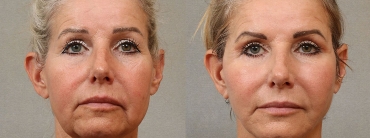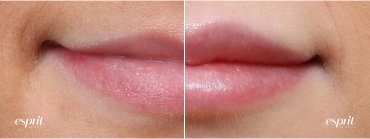Women desiring breast implant removal for breast implant illness deserve expert surgical care in the hands of a compassionate surgeon. At Esprit® Cosmetic Surgeons in Portland, we will treat you with the upmost respect and concern. We will listen to you, give you advice on your surgical condition, and map out a surgical plan to give you the best results. We photograph the implants and excised capsular tissue, show you the implants post-op, and do all appropriate diagnostic testing on the tissue.
Breast implant removal must be managed expertly to ensure excellent results. At Esprit, we have extensive experience removing breast implants for all types of implant-related problems, including breast implant illness. The surgical approach includes an en-bloc excision of the capsule when indicated.
“There are no words to express my deep-felt thanks. Your talent, medical knowledge, kindness, and skills have been a blessing to me. Thank you for all you have done” -Sunnie. Implant removal and total capsulectomy for breast implant illness.
-
What does Dr. Connall do when a patient presents with Breast Implant Illness (BII) symptoms?
First and foremost, he listens. He treats you with respect and compassion. He understands you are suffering and that you want help. He wants to fully understand your symptoms and your goals with implant removal surgery. He understands that the symptoms are real. Whether or not the symptoms are attributable to your implants for certain is impossible to know. Dr. Connall will provide you with an honest medical opinion about the role your implants are likely playing in your health and set realistic expectations about what to expect after breast implant removal. He will use his experience and skill to provide you the best, most advanced surgical care to give you the best results possible after implant removal.
-
What is breast implant illness?
Breast Implant Illness (BII) is a term used by women who have breast implants and who self-identify and describe a variety of symptoms including (but not limited to) fatigue, chest pain, hair loss, headaches, chills, photosensitivity, chronic pain, rash, body odor, anxiety, brain fog, sleep disturbance, depression, neurologic issues and hormonal issues that they feel are directly connected to their saline or silicone, textured or smooth breast implants.
The recent increase in patients reporting Breast Implant Illness (BII) symptoms appears to be related to social media. There is one Facebook group alone with more than 50,000 members, all of whom report Breast Implant Illness (BII) symptoms. This is not to say that social media is the cause of Breast Implant Illness (BII) however, it may account for the rapid increases in patient reporting. BII is not an official medical diagnosis.
-
Is there a link between medical grade silicone implants and any disease?
Silicone is a molecule that exists in nature as crystalline silica, which has been shown to activate the immune system in conditions such as systemic sclerosis which has been seen in stone masons. The silicone used in breast implants is different and has not been proven to cause any disease. This silicone does not exist in nature, it is created by hydroxylating silica to form polydimethylsiloxane. Medical grade silicone has had the antioxidants, dyes, and plasticizers removed during processing. Medical grade silicone has been used safely in scores of medical devices for over 70 years.
-
Are there any tests that would indicate a connection between breast implants and symptoms that are being labelled Breast Implant Illness (BII)?
There is no diagnostic testing specific for Breast Implant Illness (BII). This is one of the current areas of focus for the Aesthetic Surgery Education and Research Foundation, the research arm of the American Society for Aesthetic Plastic Surgery. There are tests for autoimmune diseases that can be performed to evaluate for potential causes of a patient’s symptoms. There are patients who have symptoms they attribute to Breast Implant Illness (BII) with positive immune testing and others with all laboratory tests which show no abnormalities.
-
Is there any scientific data showing causation between implants and these symptoms or any disease entity?
In 2000, The Institute of Medicine Committee on the Safety of Silicone conducted an extensive review of the available literature and concluded there was no demonstrated clear link between silicone implants and any systemic illness. There have been studies of many different sizes and design to look at the safety of breast implants themselves. These have looked at specific autoimmune disorders and diseases. In aggregate, these studies show little to no links between breast implants and any disease. Studies of patients who have symptoms that they have related to their breast implants have not shown consistent laboratory abnormalities to define a distinct syndrome. There has been very little research into this “new entity” that has been labelled Breast Implant Illness (BII) by women with breast implants.
There is no current definitive epidemiological evidence to support a direct link between breast implants and any specific disease process. However, this does not mean further research is not indicated. In rare and unusual disease processes, it can take years to come to a scientific conclusion. There are many factors that can affect the interaction between a patient and her breast implants. Further study is required to determine the best way to potentially screen patients prior to breast implant removal surgery and to determine which of the multitude of reported symptoms might improve with implant and capsule removal.
-
What is the risk of developing Breast Implant Illness (BII)?
As there is no definitive link between the often subjective and divergent list of BII symptoms, and no means for testing, there is no ‘known’ risk of developing BII after breast augmentation surgery. Many of the symptoms described by breast implant patients are experienced by the general public on a regular basis, whether individuals have breast implants or not. That isn’t to say there is no possibility of a connection between implants and BII, but simply no connection has been established to-date.
Patients should know the risks associated with breast implants, including (but not limited to) BIA-ALCL, a rare spectrum of disorders that can range from a benign accumulation of fluid around the breast (seroma) to an extremely rare lymphoma. Women should know that BIA-ALCL is not a cancer of the breast tissue itself and that when caught early, it is readily curable. If the disease is advanced, chemotherapy or radiation may be required.
-
Does implant removal improve a patient’s symptoms or cure a patient who has a medically diagnosed disease entity like an autoimmune disease?
Various studies show different degrees of improvement in patient symptoms after removal of their breast implants, some of which are temporary, and some showing permanent resolution of symptoms. There are no studies which specifically show which symptoms may or may not improve with implant removal with or without capsulectomy.
A lack of a direct, proven scientific link does not mean that the symptoms experienced by patients are not real. Patients have legitimate concerns about a potential link between breast implants and symptoms and those concerns will receive the upmost attention during your consultation with Dr. Connall. In addition, further scientific research is needed to better determine what symptoms may improve with explanation of implants.
-
What are Plastic Surgeons doing to better understand this group of systemic symptoms being called Breast Implant Illness (BII)?
Because there are many women that self-identify as having Breast Implant Illness (BII), we are listening. The American Society of Plastic Surgeon, the American Society of Aesthetic Plastic Surgeons, the FDA, and BII patient advocacy groups are coordinating their efforts to define BII and to create study protocols to learn more about it.
We cannot yet define BII and therefore cannot say with any certainty that it exists, because we do not have any tests we can run to prove or disprove its existence. However, we are listening to and partnering with our patients to determine what is the best course of action to address their complaints. Esprit® Cosmetic Surgeons participates in the National Breast Implant Registry. This web-based registry will allow tracking of breast augmentation patients over decades and to document any implant related problems that occur over time.
-
What are the surgical options for breast implant illness patients?
Dr. Connall has performed thousands of breast surgeries and he utilizes the latest operative techniques to treat breast implant illness patients. To manage the implants and scar capsule around the implant the surgical options include; implant removal without capsulectomy, implant removal with total capsulectomy, and implant removal with en bloc capsulectomy.
There are many medical inaccuracies perpetuated on the internet. BII patients tend to believe that a total capsulectomy is necessary to remove all agents related to the implants and, therefore, desire an en bloc capsulectomy. Sometimes a total, en bloc capsulectomy is simply not possible because of the risks. In such cases, some of the capsule must remain to prevent significant damage to muscles, ribs and/or lungs.
Dr. Connall has removed scores of breast capsules and he is technically skilled at doing so. He will give you an honest assessment of what is best for your case and work with you to satisfy your needs. Note: there are no surgeons, with “magical hands”, who can always excise capsules en bloc with minimal risks. Dr. Connall’s first and most critical obligation to all patients is to “do no harm”. With your capsulectomy Dr. Connall will combine his years of experience, skill, and risk assessment and strive to give you the best outcome with your capsulectomy.
-
What surgical options are available to give patients the best breasts after implant removal and capsulectomy?
Many surgical options need to be considered by all patients undergoing implant removal. Dr. Connall has extensive experience with the key options, especially breast fat grafting. Learn more information about breast implant removal.
After Breast Implant Removal
After the implants are removed it is critical to manage the next surgical steps correctly. In many patients, particularly those with at least a moderate amount of their own breast tissue, the breast skin will contract, the breasts will drape nicely, and the aesthetics will be nice. However, in patients with minimal breast tissue the breasts can look deflated. In such cases, internal scarring can lead to tethering and irregularities of the skin envelope leading to deformed breasts. The chance of such a poor outcome must be recognized pre-operatively and the surgical approach must be tailored to get excellent results.
Breast fat grafting is a great option to fill the breasts after breast implant removal. Dr. Connall is a leader in breast fat grafting. He routinely uses fat grafting to fill breasts at the time of implant removal. This approach can mitigate the risk of having non-aesthetic or deformed breasts after implant removal. In some women the best results are achieved with a second session of breast fat grafting as a later surgery.
Fat grafting can also be used to treat breasts that are deformed after en bloc capsulectomy and implant removal. Dr. Connall has an exceptional level of experience with this procedure and he has treated such patients that have had their implants removed for breast implant illness by other surgeons in and outside the U.S.
If you are experiencing the symptoms of breast implant illness and are interested in breast implant removal, Esprit Cosmetic Surgeons can help. Contact Dr. Connall at his office in Portland to schedule a consultation for more information. Call (503) 783-0544 or use our online form today.







